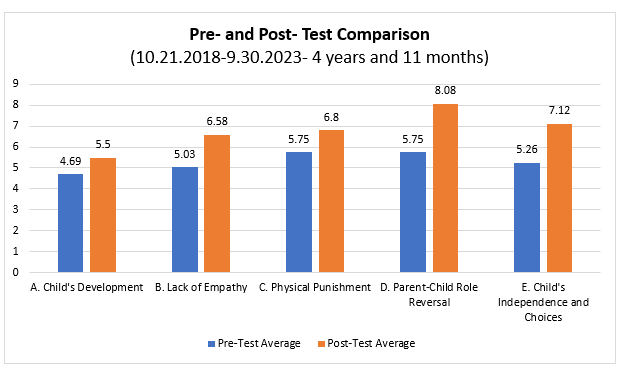Strong Character Evaluation
Strong Character Evaluation Report
;
Pre/Post Assessment Analysis 2018-2023
49507 Pilot Program Pre- and Post- tests (10.21.2018-9.30.2023) Outcome Report
351 parents (including their partners) were referred with an abuse or neglect case.
60 of 351 parents were recommended but did not participate in the course.
291 of 351 parents enrolled in the program.
- 94 of 291 parents did not complete the program for various reasons. (32%)
- 197 of 291 parents completed the program and assessments. (68%)
- 161 of 197 parents improved their pre- and post- test scores. (81.7%)
- 9 of 197 parents stayed the same. (4.6%)
- 27 of 197 parents decreased their pre- and post- test scores. (13.7%)
Current pre- and post- assessment results show the mean score for each parenting construct. Scores are categorized for child maltreatment as Low Risk (8-9), Moderate Risk (4-7), and High Risk (1-3). (Adult-Adolescent Parenting Inventory AAPI-2.1)
| Pre-Test High Risk | Parenting Constructs |
Pre-Test Mean 200 parents |
Post-Test Mean 200 parents |
Amount Improved |
| 23.42 | A. Do not understand their child’s growth and developmental stages | 4.69 | 5.5 | 8.1% |
| 23.11 | B. Lack of empathy to respond to their child’s feelings and needs | 5.03 | 6.58 | 15.5% |
| 11.38 | C. Belief in physical punishment to discipline their child | 5.75 | 6.8 | 10.5% |
| 9.12 | D. Not aware of the appropriate Parent-Child family roles | 5.75 | 8.08 | 23.3% |
| 21.4 | E. Control their child’s choices and independence | 5.26 | 7.12 | 18.6% |
*3 parents took more than one test.
The results of t-tests for each parenting construct had P values less than .0001. This can be regarded as extremely significant change that would not occur by chance. These results indicate that Ingenium has been effective at increasing positive parenting beliefs for those who have participated in the 49507 pilot program.

- average of 70 are referred per year.
- average of 58 enroll per year.
- average of 39 complete per year.
Update:
- As of 2/10/2024, 422 individuals and their partner have been referred by CPS with a confirmed neglect or abuse case to the pilot program.
Nurturing Family Pre/Post Assessment Highlights 2018-2021
By Daniel Kuchan-MiTeam Quality Assurance Analyst of Kent County DHHS. Oct. 21
Overview
The purpose of this review was to examine the statistical significance of pre and post-test results from the Adult-Adolescent Parenting Inventory (AAPI- 2.1) that is administered by Ingenium as part of their 49507 pilot program to track whether parents are developing positive parenting beliefs. The participants were 95 parents who had confirmed Child Protective Service (CPS) cases for abuse and neglect.
Start Date: November 12, 2018
End Date: June 10, 2021
Method
The raw data for pre- and post-test scores by each participant were compared for each of the five parenting constructs using a paired-sample t-test to assess statistical significance.
Results
The results of t-tests for each parenting construct had P values less than .0001. This can be regarded as extremely significant change that would not occur by chance. These results indicate that Ingenium has been effective at increasing positive parenting beliefs for those who have participated in the 49507 pilot program. Detailed results are attached
About AAPI
The Nurturing Programs incorporate three pre- and post- test self-report assessment measures:
Adult-Adolescent Parenting Inventory (AAPI) is a 40 item, norm-referenced, Likert scale designed to assess the parenting beliefs and practices of adult and adolescent parent and non-parent populations. The AAPI is designed to assess the beliefs for parenting children from infancy to 12 years of age. Responses to the AAPI provide an index of risk for child maltreatment in five parenting practices known to result in child maltreatment. These practices are presented as Constructs:
- A. Developmental Expectations;
- B. Parental Level of Empathy;
- C. Belief in the use of Corporal Punishment;
- D. Reversing Parent-Child Family Roles; and
- E. Oppressing Children’s Power and Independence.
Strong Character Evaluation Report 2019-2020
By Junghee Han, PhD, MSW, Evaluation Consultant
Ingenium’s Strong Character Program aims to develop Strong Character skills in students by increasing three areas of strong character—positive mindset, healthy emotions, and successful behaviors. At the beginning of the program, participants take a pre-test measuring each of these three areas. After the program, participants take a post-test to measure their improvement.
Description
A total of 361 responses were in Ingenium’s 2019–2020 Pre/Post Test dataset. A majority were African American at 63.3%, followed by multiracial with 22.7%, and Hispanic/Latino at 10.2%. The smallest number of cases were White at 3.2% and Asian/Pacific Islander with 0.6%. Of these participants, 193 (56.6%) were male and 148 (43.4%) were female. Participant age span was from 9 through 19, the maximum. Participant grades were 4th grade through 12th grade, with 57 in the 6th grade. Participant ZIP codes were from a total of 21 codes. Half (51.6%), or 173 participants, were from the 49507 ZIP code. The next highest ZIP code was 49508 with 9.9%, 49506 with 9.6%, and 49503 with 8.4%.
Strong Character Program Pre/Post Test Results Show Improvement
A paired samples t-test was performed to measure if there is a change before and after receiving an intervention (Strong Character). First, means from pre-tests and post-tests were compared for positive mindset, healthy emotions, and successful behaviors.
Improvement from pre-test results to post-test results occurred in positive mindset, healthy emotions, and successful behaviors. The average post-test positive mindset score was 19.72, 2.46 points higher than pre-test scores. The average post-test healthy emotions score was 19.90, 2.51 points higher than pre-test healthy emotions scores. The average post-test successful behaviors score was 20.12, 2.43 points higher than pre-test successful behaviors scores. The conclusion: the Strong Character Program is effective in increasing participants’ positive mindset, healthy emotions, and successful behaviors scores.
When the three categories were scored together to determine improvement in strong character skills, results showed improvement from pre-test to post-test results. On average, post-test total score was 59.58, which is 7.47 points higher than the pre-test total score. These results conclude that the Strong Character Program is effective in increasing participants’ total strong character scores.
Sociodemographic Variables
Race
A one-way ANOVA test to see if there was any correlation between race and test scores showed no significant relationship between pre-test and post-test total scores and race/ethnicity.
Gender
An independent samples t-test showed that there is no relationship between gender and test scores.
Conclusion
The finding is that the program is effective in improving assessment scores between pre-tests and post-tests.
To view the full Nurturing Family Pre/Post Assessment Evaluation Report for 2018-2021:
To view the full Strong Character Evaluation for 2019-2020:
